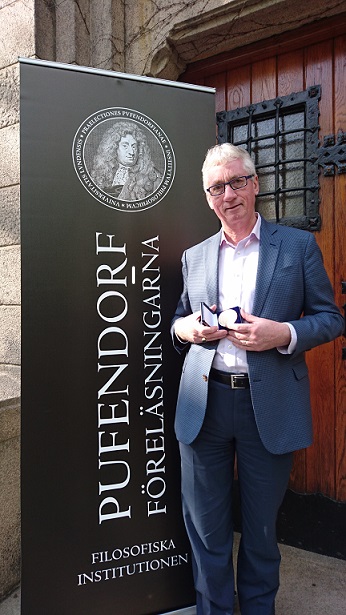2017 Frans B. M. de Waal
What We Can Learn from Animals

Dr. Frans B. M. de Waal, C. H. Candler Professor in Psychology, Director of the Living Links Center at Emory University, and Distinguished Professor at Utrecht University.
22 – 24 May 2017.
- Empathy and Cooperation in Animals
- Reuniting Morality and Biology
- Are We Smart Enough to Know How Smart Animals Are?
Empathy and Cooperation in Animals, 22 May 2017:
Reuniting Morality and Biology, 23 May 2017:
Cognition: Are We Smart Enough to Know How Smart Animals Are? 24 May 2017:
The possibility that animals may have empathy has until recently received little attention. Part of the reason may have been and yawn contagion in primates (and other mammals), the discovery of mirror neurons in macaques, as well as the first neuroscience on this phenomenon in rodents. One would have to agree with Darwin that "Many animals certainly sympathize with each other's distress or danger." Expressions of empathy range from a core mechanism of emotional contagion to cognitive perspective-taking and targeted helping.
In discussing the evidence for empathy and cooperation I will also try to bring biology and morality closer together. Attempts to achieve a reasoned, logical moral epistemology separate from biology is doomed to failure. Tendencies typical of the human species, such as empathy, compassion, tolerance, respect, and fairness will in fact do a better job producing moral guidelines than any utilitarian or consequentialist scheme based on the greater good. This doesnÂ’t mean we should not take the consequences of our actions into account, but what we need is a greater congruency between moral decision-making and our biology, and its attention to social commitments and group membership.
In my third, more popular lecture I will review how the wall between human and animal intelligence is starting to look like a Swiss cheese. Whereas a mechanistic view of animals prevailed during most of last century, an undercurrent of scientists nourished a more cognitive approach, which by now has become dominant. It started a century ago with the observation that chimpanzees solve problems with a flash of insight. Initially, this kind of research was ridiculed and suppressed, while a taboo was placed on anthropomorphism. From an evolutionary perspective, however, the most parsimonious assumption about closely related species (such as humans and apes) is that behavioral similarity reflects psychological similarity. Anthropomorphism is actually a logical position regarding our closest relatives. Neuroscience increasingly supports this view, and human uniqueness claims have fallen one by one over the last few decades. Other primates are now seen as political, cultural, perhaps even moral beings. This cognitive revolution has been rippling beyond the primates to include the entire animal kingdom, from tool-using crows to cooperating dolphins. Many unexpected new capacities have been discovered, such as that animals are aware of their own knowledge (metacognition) or reflect on past and future (time travel). I will provide a general overview of the methods and findings of animal studies with an accent on primates and elephants, but also including octopuses, corvids, cetaceans, and fish. The central message of this new science, known as evolutionary cognition, is one of mental continuity across all species, with human intelligence being a variety of animal intelligence.
